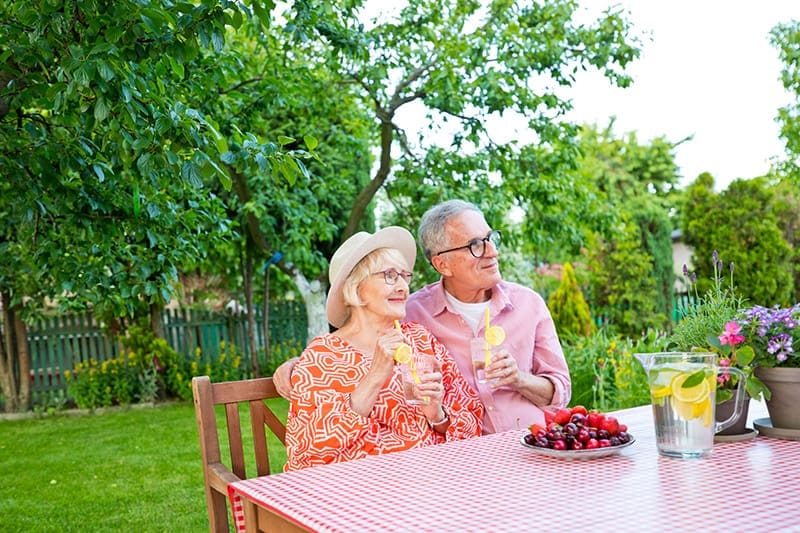Dehydration in seniors is a serious concern that often goes unnoticed. Older adults are more susceptible to dehydration because our bodies have more difficulty regulating fluid levels as we age.
As we head into the summer months, it’s important to recognize the signs and symptoms of dehydration in seniors, as it’s crucial for maintaining their health and well-being. In this guide, we’ll explore the best ways to detect dehydration in seniors, its causes and, most importantly, how to prevent it.
Signs of Dehydration in Seniors
Detecting dehydration in seniors can be challenging, as the symptoms may not always be obvious. However, being aware of the following signs can help identify dehydration early:
Dry Mouth
One of the most common signs of dehydration in seniors is a dry mouth. When there isn’t enough fluid in the body, saliva production decreases, leading to dryness in the mouth and throat.
Fatigue and Weakness
Dehydration often manifests as fatigue and weakness among seniors. Inadequate hydration directly impacts energy levels, making routine tasks more difficult to accomplish.
Dizziness and Confusion
Severe dehydration can cause dizziness, confusion and even fainting in seniors. Changes in electrolyte balance due to fluid loss can affect cognitive function and lead to confusion.
Causes of Dehydration in Seniors
Understanding the underlying causes of dehydration is essential for prevention. Several risk factors can lead to dehydration in older adults:
Reduced Thirst Sensation
As we age, the sensation of thirst diminishes, making seniors less likely to drink adequate fluids.
Medications
Some medications, like diuretics and antihypertensives, have the potential to elevate urine output, leading to a loss of fluids from the body.
Chronic Illness
Seniors with conditions such as diabetes or kidney disease may have an increased risk of dehydration due to fluid imbalances caused by their illness.
Mobility Issues
Mobility issues can make it challenging for seniors to access fluids throughout the day, leading to reduced fluid intake.

How To Keep Seniors Hydrated
Ensuring that seniors stay hydrated is crucial for their overall health and well-being. Here are some tips for maintaining proper hydration in older adults:
1. Encourage Fluid Intake
Encourage seniors to drink fluids regularly, even if they don’t feel thirsty. Offer water, herbal teas, milk and 100% fruit juices as healthy beverage options.
2. Provide High-Water Content Foods
Seniors can increase their daily fluid intake when they eat fruits and vegetables with high water content. Examples include watermelon, cucumbers and oranges.
3. Monitor Fluid Intake
Keep track of seniors’ water throughout the day to ensure they’re meeting their hydration needs.
4. Offer Variety
Seniors with dementia may experience taste fatigue, leading to a reluctance to drink the same beverages repeatedly. Providing a variety of flavors can help maintain their interest in staying hydrated.
5. Create a Hydration Routine
Establishing a hydration routine can help seniors remember to drink fluids regularly. Set specific times for hydration, such as with meals or snacks, and make it a part of their daily routine.
How To Prevent Dehydration in Seniors
Preventing dehydration requires proactive measures to ensure seniors stay adequately hydrated. Here are some tips to prevent dehydration in older adults:
1. Educate Caregivers
Educate caregivers and family members about the importance of hydration in seniors and how to recognize the signs of dehydration.
2. Provide Access to Fluids
Ensure that seniors have easy access to fluids throughout the day, whether at home or in a care community. Switching up water with options like sports drinks can also help older adults stay hydrated.
3. Use Hydration Aids
Consider using hydration aids such as straws or water bottles with built-in reminders to encourage seniors to drink more water or other fluids.
4. Monitor Temperature
During hot weather or in warmer indoor environments, pay extra attention to seniors’ water intake to prevent dehydration.
5. Seek Medical Attention
If dehydration is suspected, seek medical attention promptly. Seniors may require intravenous fluids to rehydrate if dehydration is severe.
Innovative Solutions for Hydration at Charter Senior Living
Seniors with dementia may face additional challenges in staying hydrated due to forgetfulness or taste fatigue. At Charter Senior Living, we understand the importance of addressing these unique needs. That’s why we’ve implemented innovative solutions, such as our Drink Bar, to help seniors stay interested and hydrated.
During The Drink Bar sessions, residents have the opportunity to engage in purposeful programming. They’re not just passive recipients of beverages; they become active participants in creating their drinks. Our specially trained team members supervise the process, providing guidance and support as residents mix their drinks using easy recipes, ingredients and the tools provided.
This hands-on approach not only encourages creativity but also promotes independence and confidence among residents. Plus, it’s a fantastic social opportunity, allowing residents to connect with their peers as they share stories, tips and laughs over their refreshing creations.
At Charter Senior Living, we’re committed to providing innovative solutions to help seniors stay hydrated, healthy, and happy. To learn more about Memory Care at Charter Senior Living, reach out to the nearest community to you today.


